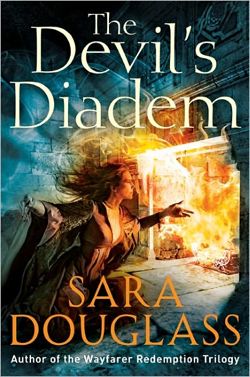The Devil’s Diadem, a brand new standalone novel by Australian author Sara Douglass, is set in a realistic but fictional version of early 12th century England. The Norman invasion is still recent history, French is the prevalent courtly language, and the Marcher Lords are powerful nobles who guard the border territory between England and Wales. Maeb Langtofte, an attractive young noblewoman whose family has recently fallen on hard times, is lucky enough to find a position as lady-in-waiting to the Lady Adelie, wife of the most powerful Marcher lord, the Earl of Pengraic. It soon becomes clear that not all is as it seems in the Earl’s household….
The early chapters of The Devil’s Diadem describe Maeb settling into her new life and learning how to navigate the court of a high-ranked noble. She serves the devout Lady Adelie and her children, befriends the other servants, and tries to stay out of the way of the grim and secretive Earl, who makes sure that Maeb knows her place. Everything changes when reports of a mysterious and deadly plague begin to appear—a plague whose victims suffer horribly before they are consumed by the flames of Hell as they die. The Earl rides out to support the King as he tries to maintain order in the land, leaving family and household safe behind the walls of Pengraic, but it soon becomes clear that this safety is just an illusion when Maeb spots one of Hell’s imps inside the castle, looking for a mysterious artifact….
The Devil’s Diadem combines elements of historical fiction, fantasy and horror. In terms of historical fiction, the novel offers a realistic look at what life must have been like in noble circles in 12th century England, especially when it comes to the role and position of women. These detailed glimpses of life at a medieval court were my favorite parts of the novel: the schedules, habits, meals, speech patterns, and especially the way religion shapes and permeates every aspect of life. The stately prose and formal speech fit the novel’s atmosphere perfectly. The pace is sedate at first but eventually picks up a bit as the plot gets going. Early on, the fantasy elements are limited to the strange nature of the plague and the real-life existence of the devil and his imps, but gradually another dimension is added to the mix, involving the “Old People” who inhabited Wales in the far past. There are also a few very effective touches of horror that will come as a shock, compared to the gentle tone and pace of the rest of the novel.
Maeb is an interesting main character who goes through a noticeable evolution throughout the novel. She starts out a bit diffident and mousy—understandably enough, given her position—but quickly starts showing more spirit than you’d initially expect. She becomes increasingly self-assured and has genuinely turned into a different person by the end of the novel. The Devil’s Diadem features several other characters who show surprising depth, including the Earl, his son Stephen, Brother Owain (who sees to the spiritual needs at Pengraic) and King Edmond, but as the vast majority of the novel is told by Maeb (in the form of a confession), she’s the real star of the show.
If The Devil’s Diadem has one problem, it’s the fact that it gives the deceptive appearance of being predictable. For most of the novel, you can clearly see who the “Bad Guy” is and where things are heading, even though Maeb doesn’t see it yet. Combine this with the slow-ish pace and you get a novel that’s often more interesting for its setting than for its plot. Fortunately, Sara Douglass throws in a twist at the very end, which shows (in retrospect) that something very different was going on all along, and what you thought was predictable was actually something else altogether… but this doesn’t change the fact that, for most of the novel, you may feel like the characters are slowly working their way towards an ending you’ve seen coming from a mile away.
The authentic, historical feel of the novel combined with the surprising final twist were enough to flip the novel from “average” to “good” for me, but I’m not sure if everyone will stick around long enough to get the full story. Because of this, I’d mainly recommend The Devil’s Diadem to people who enjoy historical fantasy, Sara Douglass’ previous works (especially her trilogy The Crucible, which it shares some characteristics with) or both.
Stefan Raets reads and reviews science fiction and fantasy whenever he isn’t distracted by less important things like eating and sleeping. Many of his reviews can be found at Fantasy Literature.










